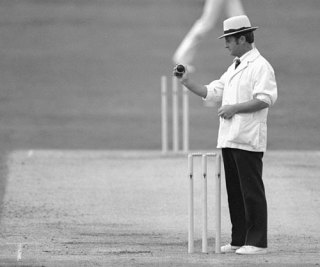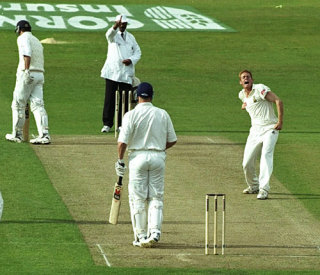After the howler which ended Kumar Sangakkara's innings in Hobart, we look at XI instances where the umpire got it wrong
| | 
|
Not the worst decision in itself, but one that started a smouldering fire that culminated in the Shakoor Rana-Mike Gatting face-off five years later. The victim was Pakistan's Sikander Bakht, who Constant gave out caught at short leg after a vociferous and united appeal from the England fielders. Replays showed he had missed the ball by some distance. The Pakistan side were deeply suspicious of Constant thereafter, and when they toured again in 1987, the PCB requested that he not be appointed to stand in any of the Tests. With a display of sheer pig-headedness, the England board brushed aside the request and the clock started ticking. The Pakistan manager branded Constant "a disgraceful person".
Shakeel Khan Pakistan v England, 1st Test, 1987-88
The 1987-88 Pakistan-England series is remembered for the Rana-Gatting face-off at Faisalabad, but the seeds of unrest had been sown by some atrocious umpiring at Lahore when Khan gave a string of dire decisions - it ran into double figures. The most infamous came when he gave Chris Broad caught behind to one that missed the outside edge by a good six inches, leading to Broad refusing to leave the middle until ushered off by Graham Gooch. The most bizarre was against Abdul Qadir, who he gave stumped before Bruce French had removed the bails.
Har Sharma North Zone v Australians 1969-70
If at first you don't succeed, try again. When North Zone's opener Vinay Lamba got a thick edge to spinner John Gleeson it seemed a clear-cut decision, only Sharma remained unmoved. The Australians, after a few moments of waiting, then launched a second appeal, with everyone joining it regardless of where they were on the field. Sharma decided weight of numbers was the key and gave Lamba out.
Bapu Joshi India v West Indies 5th Test 1948-49
India set about chasing 361 in even time in Bombay to level the series, and made a really good fist of things. With 15 minutes left they needed 21 runs. West Indies wasted time with drinks and field changes, but India were left requiring 11 off two overs. They got five off the first five balls and then, to the batsmen's disbelief, Joshi called time and whipped off the bails. Not only had he miscounted the number of balls in the over, but he had miscalculated the time as well. The West Indies fielders left the middle to jeers and cat-calls
Douglas Sang Hue West Indies v Pakistan 2nd Test 1976-77
Sang Hue had already made news in 1973-74 when he gave Alvin Kallicharran run-out in the Port-of-Spain Test, only to reverse the decision overnight, but three years later he reprieved Roy Fredericks when he appeared for all the world to be short of his ground when on 99. According to Imran Khan in his autobiography, Sang Hue turned to Mushtaq Mohammad and admitted that while Fredericks had been out "you don't have to live here".
BC Cooray Sri Lanka v England 2nd Test 2000-01
In Kandy, local umpire Cooray had what might politely be described as a shocker, and he saved his worst for the home side with as many as 15 dubious decisions. Sanath Jayasuriya's dismissal summed up how bad things were, slashing to Graham Thorpe at third slip ... the only problem being that the edge had flown into the ground on its way to the catcher. A livid Jayasuriya stormed off, his helmet reaching the boundary long before he did. Nasser Hussain was also reprieved three times on his way to a hundred. The sad thing is that Cooray was a top umpire but probably past his sell-by date. The public in Sri Lanka turned on him, nicknaming him "Bad Call" Cooray, and he retired admitting to have had "many sleepless nights after that match".
| | 
|
A performance which was so bad that it ended being caught up in the match-fixing row a couple of years later. The entire series was dogged with dissent over umpiring, and things came to a head in a nailbiting Leeds Test. Wisden referred to Akhtar's "four days of painful notoriety". He gave nine of 10 lbw decisions awarded during the match, eight of them against South Africa, of which seven were "dubious". In 2000, at the King Commission hearing into match fixing, Ali Bacher claimed that Akhtar had been paid by bookmakers; Akhtar countered by threatening to sue and saying: "I curse such filthy money. No one dared to contact me with such intentions like match-fixing or any other malpractice."
MV Nagendra India v England 4th Test 1976-77
As a Test batsman, Mike Brearley needed all the breaks he could get, so it is perhaps understandable when his usually clam exterior was ruffled when he edged Chandrasekhar to Viswanath at slip on what he believed was the half volley. "There was not another pair of eyes on the ground who thought it had carried," observed The Times. To make things worse, as he sat eating his lunch Nagendra came over and said: "Mr Brearley, I am very sorry. I knew it was not out, but I felt my finger going up and I just couldn't stop it."
Bill Bestwick Middlesex v Sussex 1936
A heavy drinker, Bestwick had to have a minder with a player to ensure he stayed off the beer, although more often that not he managed to give his sentinel the slip. After retiring, he became a respected umpire, but in 1936 he attracted the ire of Gubby Allen when he gave Denis Compton out llbw. Compton, 18, was making his first-class debut for Middlesex and batting at No. 11. A furious Allen remonstrated with Bestwick, who, in a refreshingly honest reply, explained that he was dying for a pee and that he would have wet himself had he not ended the innings.
Lloyd Barker West Indies v England 4th Test 1989-90
Another instance of an umpire being persuaded to change his mind. A ball from Curtly Ambrose appeared to flick Rob Bailey's thigh pad on its way through to Jeff Dujon. Barker appeared to have turned down the appeal but Viv Richards, who was at first slip, came charging down the pitch roaring appeals and Barker belatedly, and to Bailey's undisguised dismay, raised his finger. "The umpire wasn't going to give that but Richards created merry hell," yelled Tony Greig, commentating at the time. Wisden described Richard's "finger-flapping appeal" as "at best undignified and unsightly. At worst, it was calculated gamesmanship". Wisden Cricket Monthly referred to his "orgasmic gesticulations". "When I looked at the TV replays he had clearly missed it ... my angle and position told me he had hit it," Richards later admitted, but he added that while had had appealed "long and loud", the umpire was to blame. "It was up to him to retain his composure and make his decision."
David Shepherd England v Pakistan 2nd Test 2001
Shepherd proved that even the best umpires have their off days. At tea on the last day, England were 196 for 2 and on course for a draw. In the last session, they lost eight wickets, four to no-balls that the umpires failed to spot, even though the third umpire had flagged the point earlier in the day. Three of those errors came at Shepherd's end, and he was so upset when he later watched TV replays that he considered retirement. Some argued that at 60, he was on the slide. But the cricket world sprung to his defence, and Denis Rogers, chairman of the Australian Cricket Board, said: "Shep has a reputation as one of the finest umpires in the world, and that should not be destroyed because he has missed a few no-balls. It's precisely umpires of his status and quality that we need." When the first group of elite umpires was announced later that year, Shepherd was at their head.
Martin Williamson is executive editor of Cricinfo
© Cricinfo



No comments:
Post a Comment